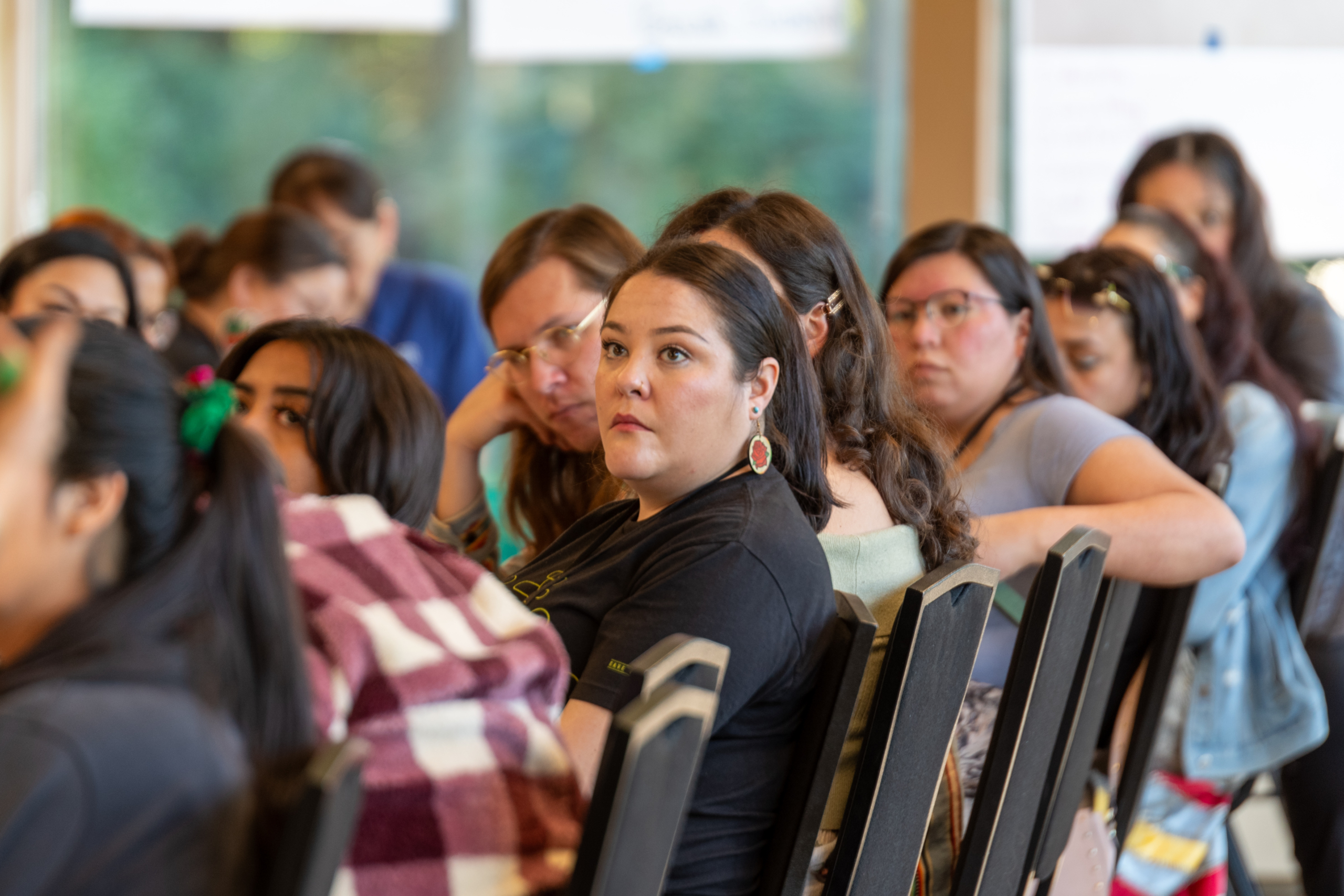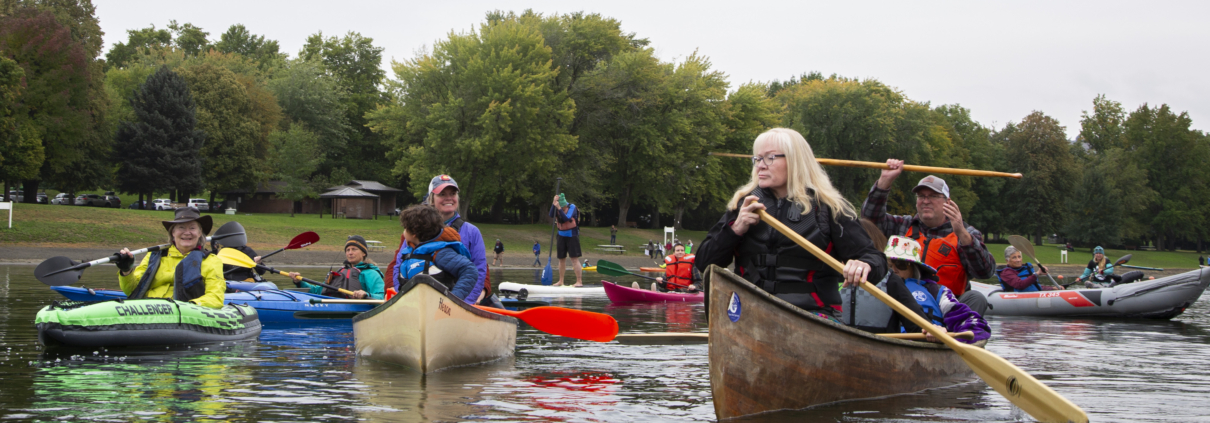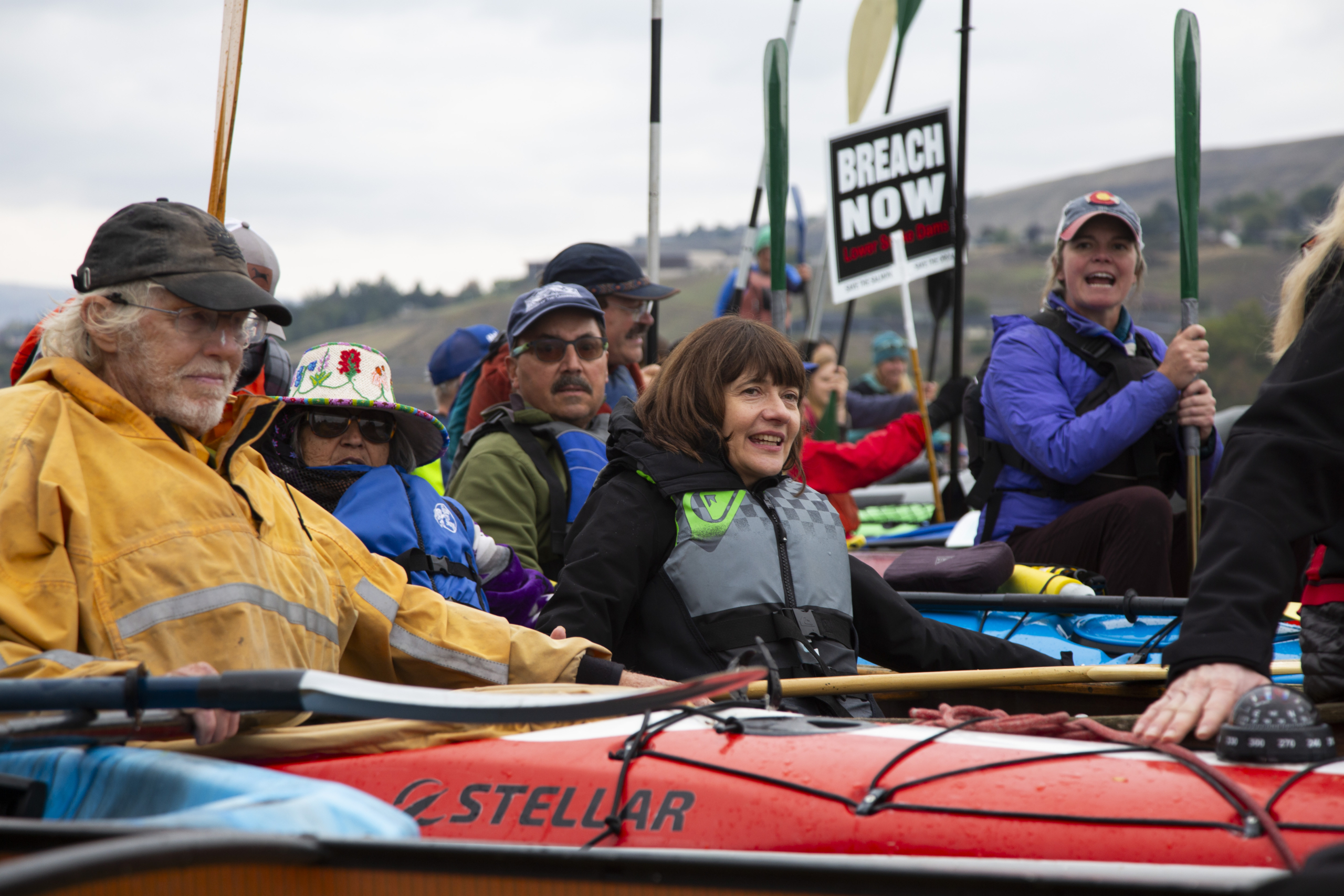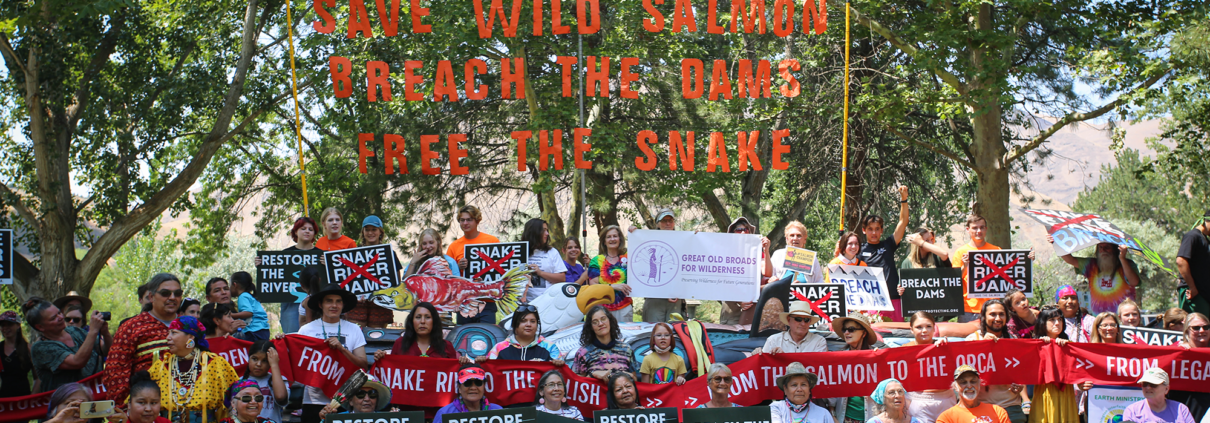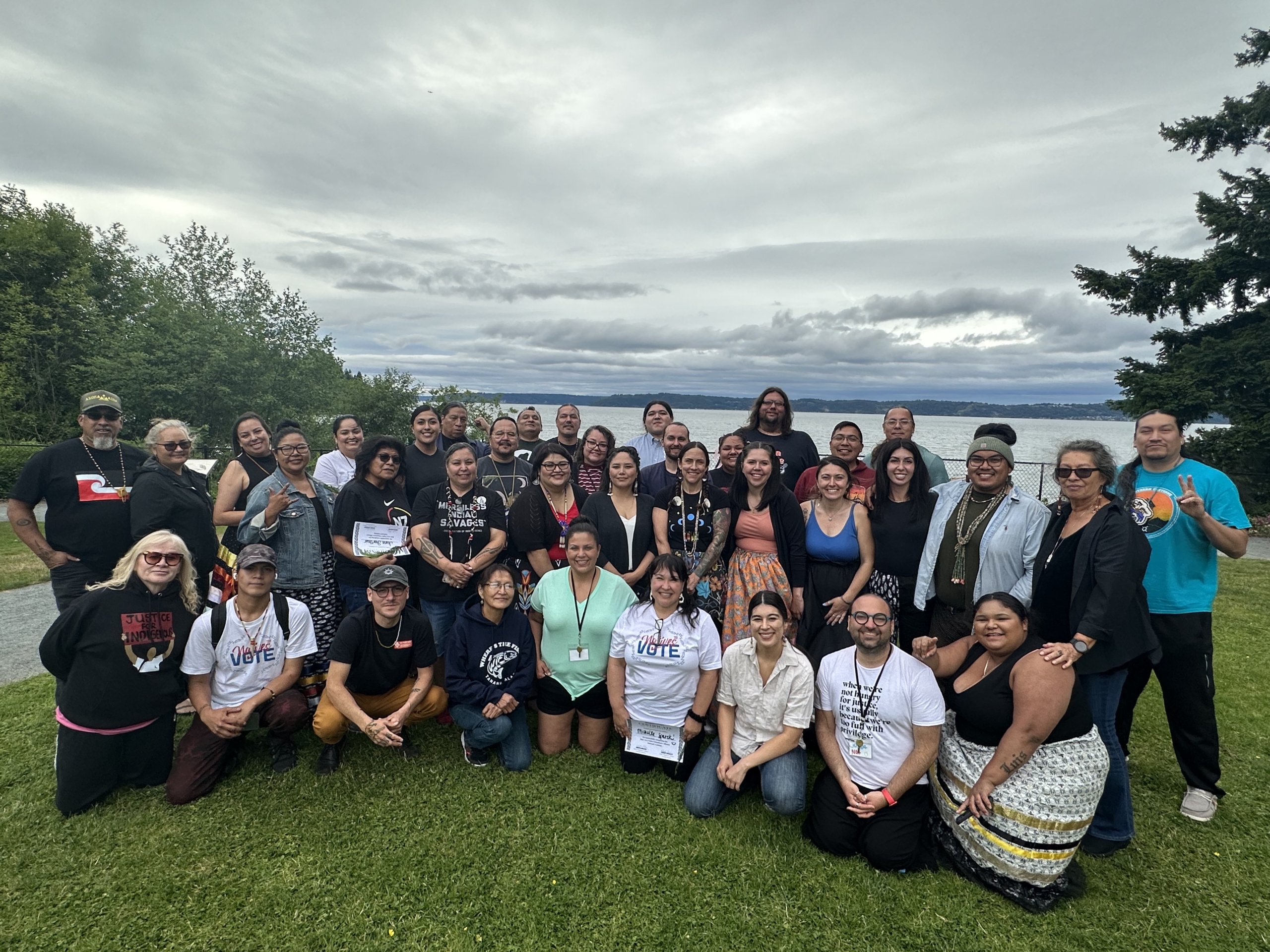Native Organizers Alliance 2023 in Review
Download our 2023 Annual Report here.
It’s a new year! And while we are preparing for the upcoming events of 2024, we also know it is important to reflect on the various accomplishments of the previous 365 days.
While so much of our organizing includes on-the-ground trainings, email campaigns, and education, Native Organizers Alliance was included in 26 panels, webinars, podcasts, and interviews.
Here’s a look at just some of the projects we were involved in throughout 2023:
 Training Program
Training Program
Our Native Community Organizer Training is for Native leaders, nonprofits, and organizations both in rural and urban communities. During these in-person sessions, we share new skills and strategies that are vital for effective organizing.
In 2023, we held 1 National and 7 State-Based or Regional Trainings for a total of 245 total training participants.
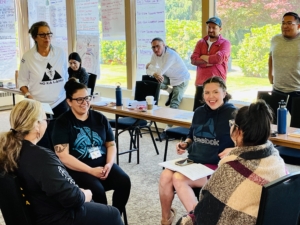
Save Oak Flat
In Spring 2023, we were notified of a Trump-era deal, which would hand over Oak Flat in Arizona to a notoriously devastating mining corporation. We organized an email campaign that supported the San Carlos Apache and Apache Stronghold, who are on the ground and working towards permanent protections for Oak Flat. Thankfully, the Biden administration listened, pushing that approval.
The constant attack on Oak Flat is why we also have shown support for Rep. Raúl Grijalva’s Save Oak Flat from Foreign Mining Act. Let’s keep up the fight to protect Oak Flat for future generations!
Re-Indigenizing National Parks
At Native Organizers Alliance, we’re working with Tribes, Native communities, and grassroots organizers across the country to grow the movement to re-Indigenize and protect national parks. In 2023, we used social media and our email list to push for co-management legislation as well as programs that would teach the Indigenous histories of the land where these parks exist.
We also organized a letter program to President Biden to establish a new national monument to protect the Grand Canyon. Tribal leaders and organizers were able to celebrate the years of work put towards this designation when the White House announced Baaj Nwaavjo I’tah Kukveni:
“Ancestral Footprints of the Grand Canyon National Monument will conserve nearly 1 million acres of public lands surrounding Grand Canyon National Park. The new monument protects thousands of cultural and sacred sites that are precious to Tribal Nations in the Southwest – including the Havasupai Tribe, Hopi Tribe, Hualapai Tribe, Kaibab Band of Paiute Indians, Las Vegas Paiute Tribe, Moapa Band of Paiutes, Paiute Indian Tribe of Utah, Navajo Nation, San Juan Southern Paiute Tribe, Yavapai-Apache Nation, Pueblo of Zuni, and the Colorado River Indian Tribes.”
The White House on August 8, 2023
Honoring Chaco Initiative
Many of our partners are fighting to protect Greater Chaco Canyon in New Mexico, a sacred place with deep cultural significance for Indigenous people. While steps have been taken to protect certain areas of Greater Chaco from industrial exploitation, more needs to be done to truly safeguard the safety and well-being of this cultural landscape and surrounding communities. We will continue to uplift this need and support The Honoring Chaco Initiative.
This legislation is a first-of-its-kind effort to change the paradigm of public lands management in this sacred landscape and finally prioritize the health, economic, and environmental justice, equity, and sustainability of the region.
All Our Relations Snake River Journey
Native Organizers Alliance was honored to be a part of the Indigenous-led 2023 All Our Relations Snake River Journey. Traveling through Washington, Oregon, and Idaho in September and October the campaign set out to build community and demonstrate the momentum of public support for restoring salmon to abundance and upholding treaty promises to Northwest Tribes.
Read more about our time on the journey here.
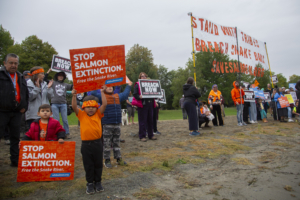
Free Leonard Peltier
Leonard Peltier is the longest-incarcerated political prisoner in our country. The fight for Leonard Peltier’s freedom continues to this day. In the fall, we brought together a coalition of organizations to bring renewed pressure on the Biden Administration to act.
We rallied for support via a petition with 70,000+ names that was then delivered to the White House by Congressman Raúl Grijalva.
Indigenous Futures Survey
The Indigenous Futures Survey is an annual survey that aims to capture Indigenous people’s voices, perspectives, and concerns for use in developing policy, understanding socio-economic trends, and highlighting important issues impacting Indian Country.
This information will help inform Tribal leaders and members of Congress about issues facing Indigenous People and inform so much for the upcoming Native Vote 2024.
The success of this year’s IFS is only possible because of the 10 fellows who worked in their communities with local organizations. Each fellow is part of our ‘moccasins on the ground’ approach and their work is important in the continued community and power building that makes grassroots organizing possible.
This year’s survey is co-led by IllumiNative and Native Organizers Alliance, with Kauffman and Associates, Inc. supporting the survey development and analysis.
DAPL and the Draft Environmental Impact Statement
After many years of delays and a fatally flawed Draft Environmental Impact Statement (DEIS) written by a member of the American Petroleum Institute — a clear conflict of interest — the Army Corps of Engineers finally took public comments on this dangerous violation of the sovereignty of the Standing Rock Sioux Tribe.
Through our channels, we were able to submit over 101,000 comments on this DEIS. The fight against DAPL might have begun in 2016 but we will continue to stand in support of Tribal sovereignty until this pipeline is no longer a threat to the area.
Help Make History
Congresswoman Deb Haaland is the right choice for the Secretary of Interior. As an enrolled citizen of the Pueblo of Laguna, and one of the first two Native American women elected to Congress, she has spent her life standing up for Native people and tribal sovereignty.
Contact your Senators to confirm Haaland’s appointment today!

The Department of Interior is responsible for upholding the treaty and trust responsibilities to the 574 federally recognized tribes in the United States. These tribal nations together comprise more than 5.2 million American Indians and Alaska Natives whose forebears made incalculable sacrifices in the history of our nation. The daily decisions and actions of the Department of Interior directly impact tribal communities, more so than any other in the United States. The scope of these decisions range from economic development, education, law enforcement, self-governance, and tribal trust lands. But, in its 171-year history, the Department of Interior has never been led by a person who represents the people most affected by the decisions of the Department.
The U.S. Department of the Interior has a unique responsibility to Native people. DOI is the primary federal agency charged with carrying out the United States’ trust responsibility to American Indian and Alaska Native people, maintaining the government-to-government relationship with the federally recognized tribes, and promoting and supporting tribal self-determination.
DOI oversees programs that affect virtually every part of daily life for Native people and tribal communities. DOI oversees the Bureau of Indian Affairs and the Bureau of Indian Education, the Bureau of Trust Funds Administration, which holds billions of dollars generated from tribal lands in trust, 55 million acres of tribal land, tribal law enforcement, housing improvement, disaster relief, administration of tribal courts and more.
The Department of Interior should be led by someone who represents the communities and people whose lives it impacts most. In it’s 171 year history, the DOI has never been led by a representative of the people it most affects. Since inception, DOI has been led by 53 different secretaries of the interior, all of whom were white people.
Congresswoman Haaland is a champion for Indigenous communities everywhere. As an enrolled citizen of the Pueblo of Laguna, and one of the first two Native American Women elected to Congress, Deb Haaland has spent her life standing up for Native people and Tribal Sovereignty.
The appointment of Congresswoman Haaland as Secretary of Interior has bipartisan support. Congresswoman Haaland cares deeply about rural and western communities and comes from a family of hunters, farmers, and ranchers. Members of Congress on both sides of the aisle see this and believe she will have a balanced approach to Interior decisions; ones that will represent all Americans including rural communities, reservation communities, working class communities and communities of color whose perspectives and experiences have too often been ignored.
Congresswoman Haaland represents all Americans. Congresswoman Haaland understands the economic struggles that so many Americans are experiencing, because she has lived those struggles. She grew up in a military family and attended 13 different public schools. After graduating high school, she worked at a New Mexico bakery for 13 years then, at the age of 28, enrolled at the University of New Mexico, living paycheck-to-paycheck, relying on food stamps, and occasionally dealing with homelessness as a single mother. She owned a small company called Pueblo Salsa that she ultimately sold in 2005 to attend University of New Mexico Law School.
Congresswoman Haaland is ready to lead the Department of Interior. Through her many leadership roles in the House of Representatives, Haaland is the architect of a vision for how America can conserve at least 30 percent of America’s land and water by the end of the decade – a landmark commitment reflected in the Biden-Harris climate plan. With her experience helping lead the House Natural Resources Committee, Haaland is well-prepared to accelerate renewable energy production on America’s public lands and ocean, and to create jobs by restoring and protecting our parks and wildlife for future generations.
Nominating Congresswoman Deb Haaland would be a historic nomination and illustrate America’s commitment to righting the injustices of the past. Congresswoman Deb Haaland would be the first Native American Cabinet Secretary. This historic nomination reflects President-elect Biden’s determination to confront long-running injustices toward Indigenous peoples in America and to finally and fully uphold our country’s trust and treaty obligations to tribal nations.
Deb Haaland Nominated for Secretary of the DOI
At Native Organizers Alliance we launched a campaign to advocate for Congresswoman Deb Haaland to be nominated for this important position in President-elect Joe Biden’s Cabinet. With your help and that of our grassroots organizers we delivered a list of 18,000 people’s names endorsing Deb Haaland for Secretary of the Interior to Biden’s transition team showing widespread support for her nomination.
“Rep. Haaland’s nomination to lead the Department of the Interior is a historic moment for tribes and the representation of Native peoples in our federal government. Her nomination validates the impact Native people had in this year’s presidential election. For the first time, we will have a person who looks like us and understands the complexities of treaties and tribal governments in the process of overseeing public lands.
Rep. Haaland brings deep experience in natural resources and tribal sovereignty, and an understanding of our Indigenous ways of protecting our lands, waters, fish, and wildlife. Native peoples have always been stewards of this land but we have not always been in the political positions to make the key policy decisions that shape our natural resources.
We praise President-elect Joe Biden for his decision to nominate a Native woman for a position that has tremendous impact on tribal governments and our cultures and traditions. This decision will have a lasting impact on Indian Country, and we can only hope it is the first step in reversing a long history of the federal government’s failure to uphold our treaties and a signal that the Biden administration will make good on its trust responsibilities.” – Judith LeBlanc (Caddo) Director of Native Organizers Alliance
Natives Vote
The 2020 election is an inflection point to further build Native peoples’ visibility and political power by ensuring that Native voices are heard. Our communities have untapped power because of our history, our ancestors—we must use it in many ways from the streets to the ballot box. Our collective power is necessary to move our work forward.
Natives Vote is a collaboration between IllumiNative, Native Organizers Alliance and First Peoples Worldwide. Our organizations have joined together to provide information, resources, and content to drive voter engagement in Indian Country.
Under this campaign, we are commissioning art from at least 50 Native artists including a collaboration between fashion designer Bethany Yellowtail and Steven Paul Judd with a line of apparel available at B. Yellowtail.com
We hosted two impactful virtual town halls on Facebook Live about the importance of voting and representation on Sept. 22, National Voter Registration Day, and Oct. 14.


National Native American Town Hall
In July 2020 we co-hosted The Time Is Now National Native Town Hall on our Facebook LIVE.
Moderating our Native Peoples, Not “Native” Mascots panel is Suzan Shown Harjo (Cheyenne and Hodulgee Muscogee), Lead Plaintiff, Harjo v. Pro Football, Inc; President, The Morning Star Institute. With panelists: Amanda Blackhorse (Diné) Lead Plaintiff, Blackhorse v. Pro Football, Inc., Carla Fredricks (Mandan Hidatsa, and Arikara Nation) Director, First Peoples Worldwide, and Dr. Stephanie Fryberg (Tulalip) University Diversity and Social Transformation Professor of Psychology, University of Michigan.
And Joined by: Notah Begay III (Pueblos of San Felipe and Isleta/Diné), PGA TOUR winner, Founder, NB3 Foundation.
The second panel is about Mt. Rushmore – the Fight for Indigenous Rights and Against White Supremacy
Join moderator Tiffany D. Cross, On-Air Analyst & Author with panelists: Faith Spotted Eagle (Yankton Sioux) Founder, Brave Heart Society, Tribal Chairman Rodney Bordeaux (Rosebud Sioux Tribe), and Nick Tilsen (Oglala Lakota) Founder, NDNCollective
Followed by How Do We Build a Multiracial Movement for Justice and Equity – moderated by Crystal Echo Hawk (Pawnee) Executive Director of IllumiNative, with panelists Derrick Johnson, President NAACP, So you want to talk about race- Ijeoma Oluo, our very own Judith LeBlanc(Caddo) Director, Native Organizers Alliance, and Marya Bangee, Executive Director, Harness.
Native Organizer’s Alliance Ribbon Skirt Webinar
Learn to sew a ribbon skirt with us!
We hosted a 90-minute interactive online tutorial with Alexandra Romero-Frederick (Oglala Lakota), on Indigenous ribbon skirt making.
All of our relatives, Native and non-Native, and all genders are invited to watch and learn.
For Indigenous people, the ribbon skirt tells a story of endurance, strength, spirituality, adaptation and survival.
Today, the ribbon skirt is worn to gatherings that have political, cultural, and social significance. It is a signifier of Native women’s grassroots power.

